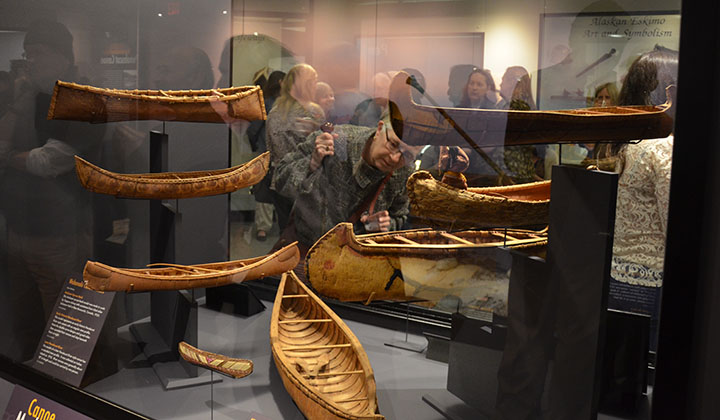 Legacy of Penobscot Canoes. Peabody Museum - Harvard University
Legacy of Penobscot Canoes. Peabody Museum - Harvard University Symposium: Museums and Exhibitions as Materialisation of Knowledge Orders
The history of the museum is closely connected not only with the history of collecting and collections, but also with the history of science and the humanities in Europe and the We-stern world. Science museums, natural history museums, cultural history and art museums have – by means of their presentation of objects – always been sites of both the production and the circulation of knowledge. On the one hand, objects, artefacts and specimens have been collected and classified in order to gain empirical and/or theoretical insights and there-by produce knowledge. On the other hand, the resulting collections were and are used in exhibitions in order to communicate academic findings to a broader audience and thereby popularize scientific/academic knowledge. Hence, museum collections as well as displays can be understood as manifestations of specific, historically shaped popular or academic orders of knowledge. However, knowledge is not only stored and transformed through objects in museums. Rather, museums themselves can be regarded as artefacts and as »morphomes«, which establish, reinforce and transmit, but also transform and reconfigure systems of know-ledge. The aim of the conference is to discuss different types of museums and exhibitions from this angle, and particularly to reflect on transformative moments in the history of museums.
Program
Wednesday, April 13 – Keynote Speech
7.30 pm Alain Schnapp / Université Paris, Klassische Archäologie
Aesthetics of ruins, aesthetics of cabinets of curiosities from the
Ancient Near East to the Enlightenment
9.00 pm WELCOME RECEPTION
Thursday, April 14 – Collecting and Exhibiting the Self and the Other
9.00 am Dietrich Boschung: Begrüßung / Welcome Address
Larissa Förster & Jörn Lang: Introduction
9.45 Dominik Collet / Universität Göttingen
Staging Separation – Distant Worlds in Early Modern Museums
10.30 COFFEE BREAK
11.00 Timon Screech / University of London
Mirrored Knowledge: Rangaku Collections in Japan
11.45 Christina Kreps / University of Denver
Expanding the Museum Concept Across Time, Space, and Cultures
12.30 LUNCH
2.30 pm Amy Lonetree / University of California
Indigenizing Museums: Representing Native Voice in National and Tribal Museums
3.15 pm Paul Williams, New York / Appelbaum Associates, New York City
Tangible expressions of the postcolonial nation: biculturalism at the Museum of New Zealand Te Papa Tongarewa
4.00 Discussant: Patricia Hayes, University of Western Cape (Fellow at Morpho-mata)
4.30 COFFEE BREAK
5.30 TRANSFER TO THE MUSEUM
6.00 Guided tour through the new Rautenstrauch-Joest-Museum / Cultures of the World, Cologne (with Clara Himmelheber, Curator in the Department of Africa)
8.00 DINNER
Fridy, April 15 – Transformative Moments in Art, History and Science Museums
10.00 am Susan Walker / Ashmolean Museum of Art & Archeology, Oxford
Crossing cultures, crossing time: a transformative moment for the Ashmolean Museum
10.45 Renate Flagmeier / Museum der Dinge, Berlin
Das Museum der Dinge: Komposition statt Klassifikation (vorläufiger Titel)
11.30 Heidi Amrein / Nationalmuseum Zürich
Some thoughts on the development of knowledge transfer at the Swiss National Museum
12.15 LUNCH BREAK
2.15 pm Helmut Trischler / Deutsches Museum München
Die Kodifizierung der Wissensordnung von Naturwissenschaft und Technik. Das Wissenschafts- und Technikmuseum an der langen Wende zum 20. Jahrhundert
3.00 Petra Lutz / Deutsches Hygiene-Museum Dresden
Die Popularisierung des Menschen. Konstellationen von Objekten und Betrachtern im Deutschen Hygiene-Museum
3.45 Concluding discussion
4.15 COFFEE BREAK
5.00 TRANSFER TO THE MUSEUM
5.30 Guided tour through Kolumba, Art Museum of the Archbishopic of Cologne (with Stefan Kraus, Director)
Venue
University of Cologne, Germany
Center for Advanced Studies
Morphomata: Genesis, Dynamics and Mediality of Cultural Figurations
Weyeltal 59 (3rd floor) 50937 Cologne
- DOWNLOAD CONFERENCE PROGRAM
Attachments
Museology /